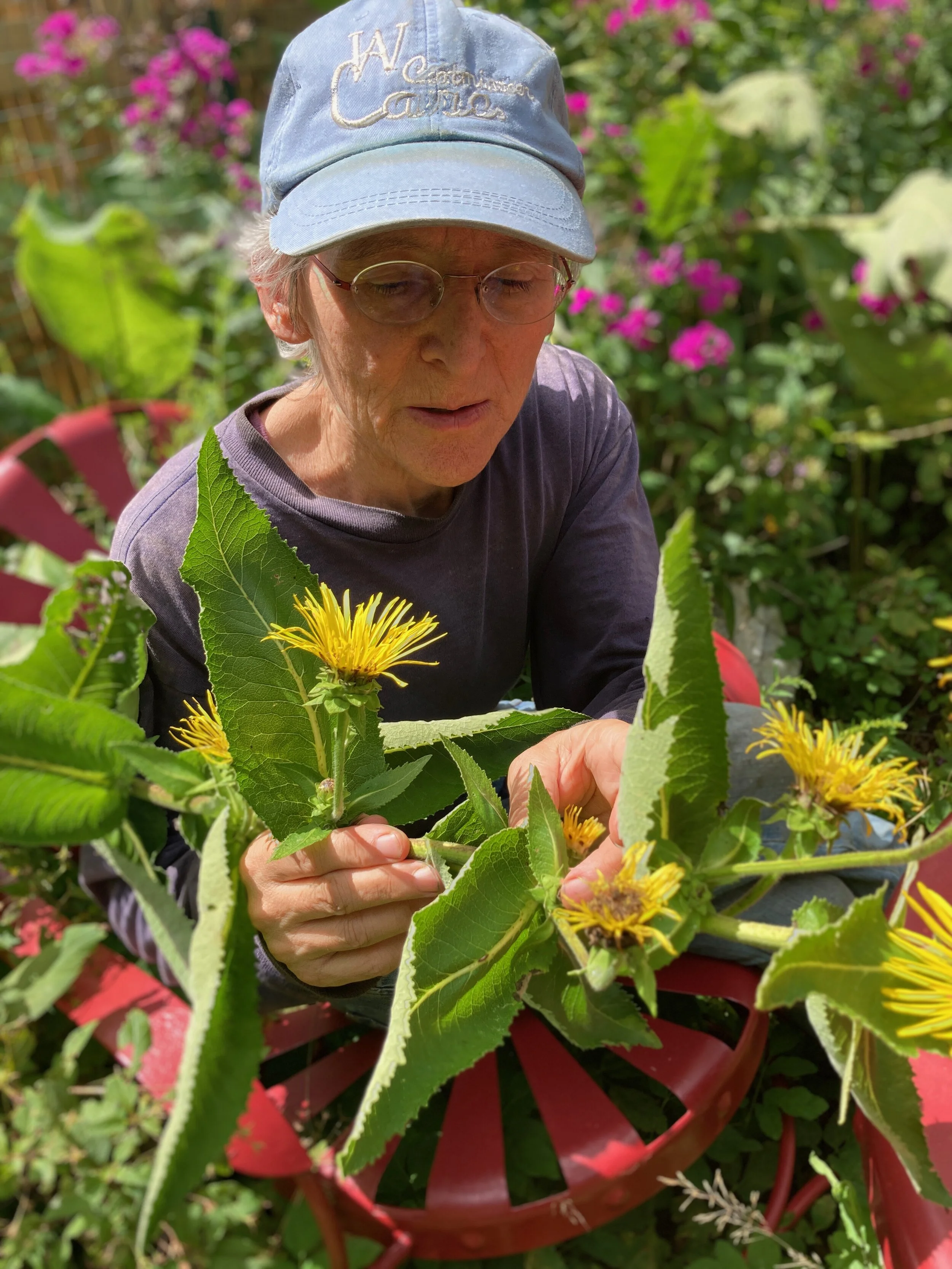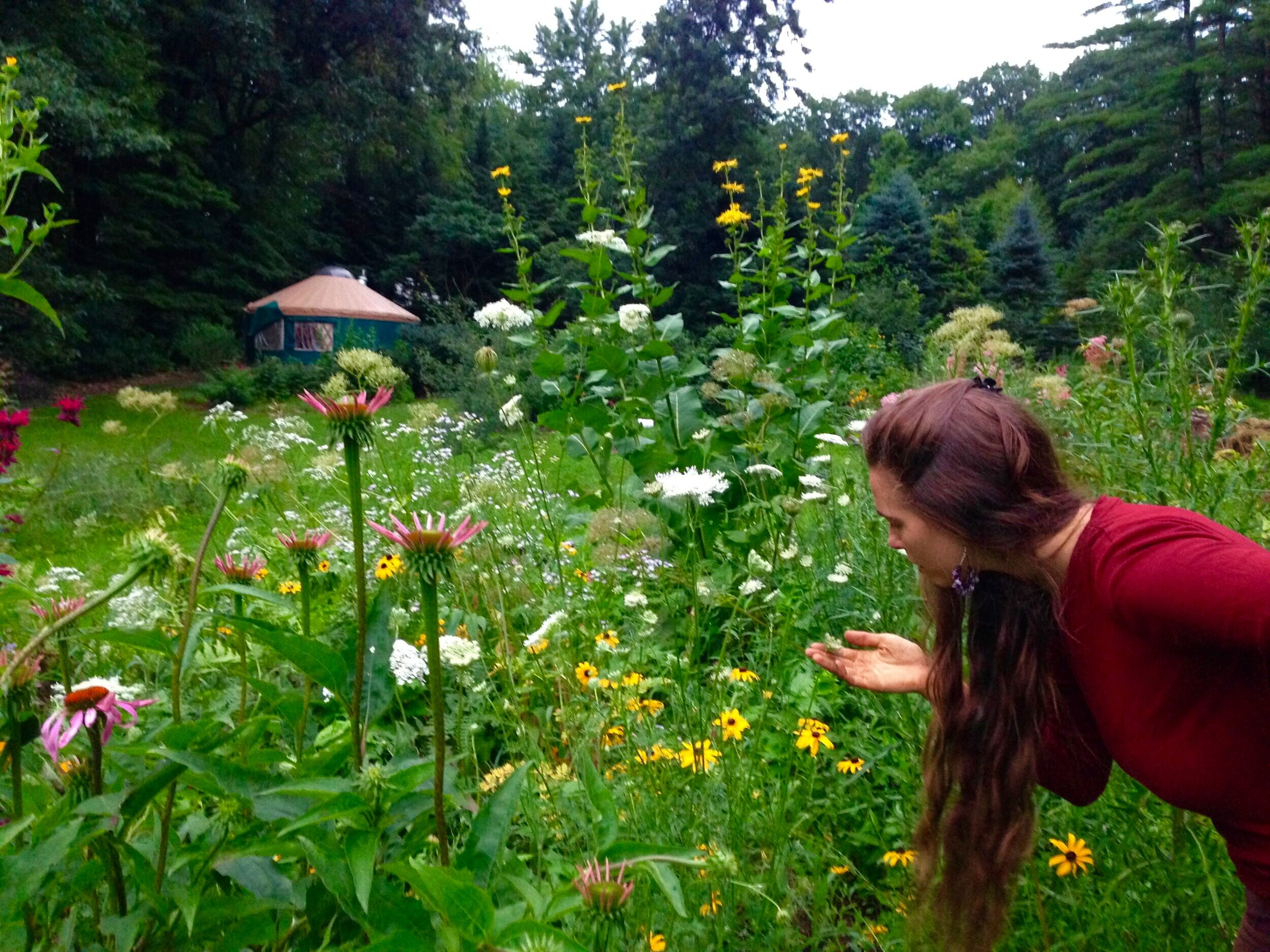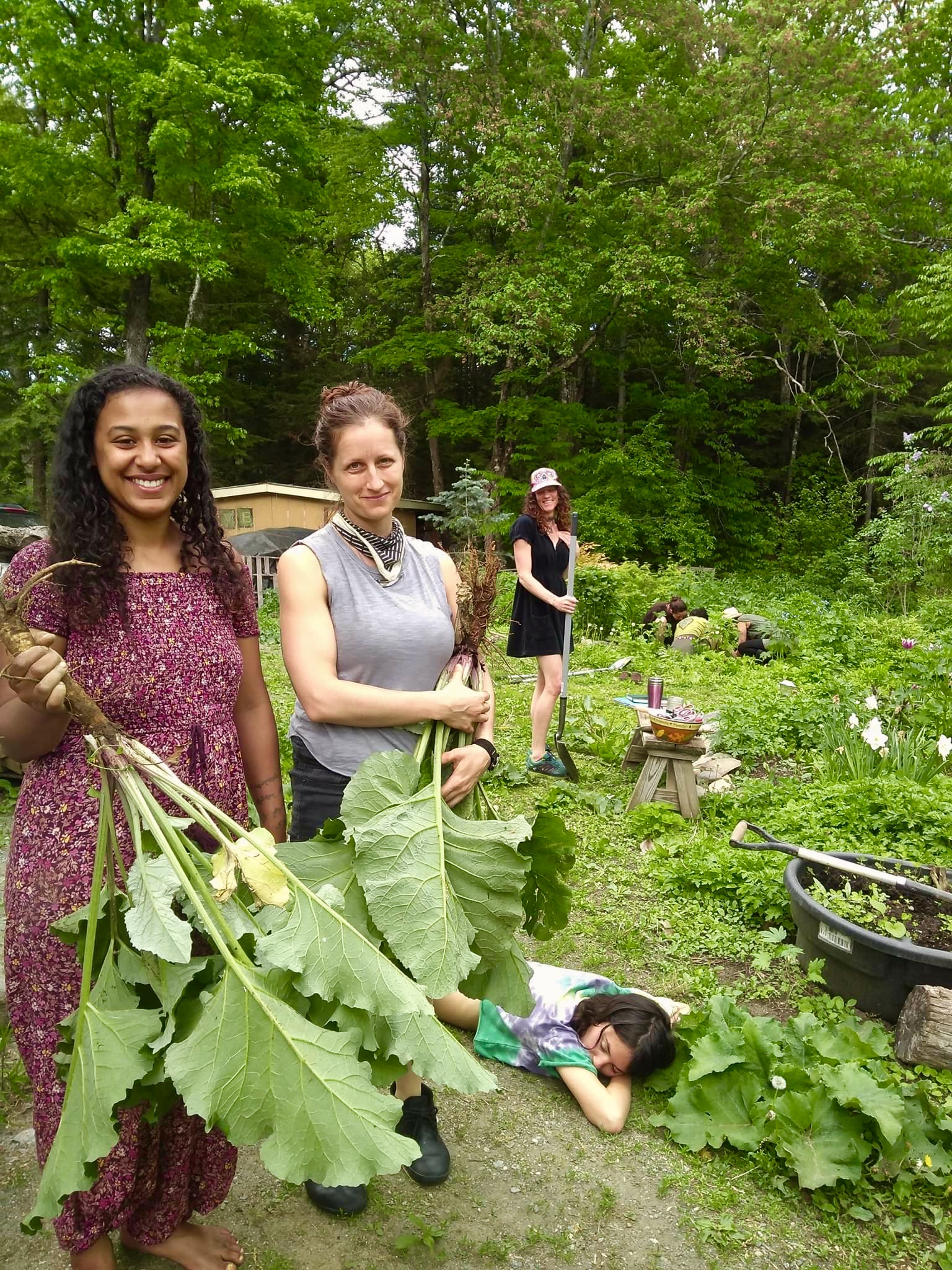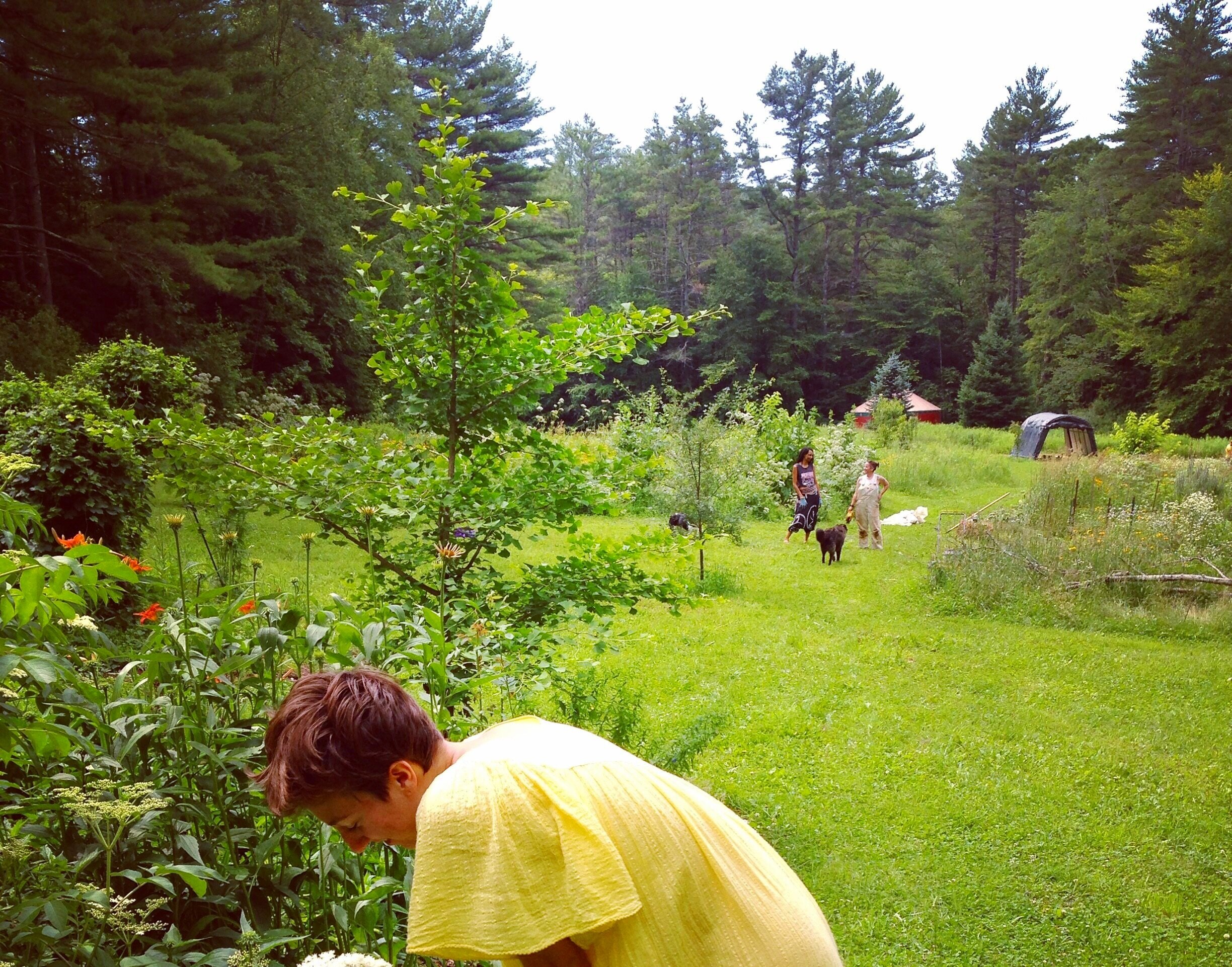Ecological Agriculture Course
Farming & Gardening with Nature in Mind
April - October
*** Course cancelled for 2021 due to family emergency!
Thursdays monthly with Tatiana Schreiber
10 sessions from 10:30am – 3:00pm
Students will have online access for Q & A in-between classes. Our first month will meet via zoom and online learning due to cold weather. In person classes will begin in May! Class will be held at The Gaia School of Healing’s herb & food gardens.
Join us for a course on creating productive and sustainable home gardens! Ecological agriculture seeks to support nature as a whole while also providing us with organic farm fresh food and medicine. Learn to create food and healing gardens which benefit the healthy interaction and interdependence of multitudes of soil organisms, insects, and plant species.
Ecological agriculture focuses on mimicking natural ecosystems in the garden. While gardening is inherently a human-ordered practice, we can use what we know of nature’s processes to benefit the ecosystems we live in, as well as create more thriving gardens. In this course we will explore creating gardens that support the healthy interaction and interdependence of the multitude of soil organisms, insect and plant species that exist in any garden environment. The intent of this course is to explore the methods we can use to achieve a productive landscape while also respecting the diversity of life sharing that landscape with us. Each of us brings our own history, beliefs, values and experiences to this ongoing conversation and experimentation. There is no one correct method; each landscape is different and each human in that landscape will interact with it differently. Collaboratively, we will emerge from our work together with many new and creative ideas, insights, and visions for the future!
Course Topics Include ~
Weedless gardening or “the miracle of mulch!”
Green Manures and Cover cropping
Insect-plant interactions and techniques to support beneficial insects
Enhancing biodiversity in and around gardens and orchards
Social & Political dimensions of ecological agriculture. Agroecological systems in Mexico, Central America, and Asia
Permaculture/agroforestry systems & Site analysis
Edible land-scaping and much more!
Design and planning of vegetable gardens.
Seed starting & growing transplants.
Potting on, and planting out a wide diversity of vegetables, medicinal plants, & herbs
Crop rotation, companion planting and interplanting to minimize disease and “pest” problems
Principles of soil health and soil building
Monitoring and resolving “pest” and disease problems
Composting biology and methods ~ the microbiology of compost.
Intensive raised bed, minimum till systems
Ecological Agriculture Course Tuition ~
Tuition for 2021 is $700 - $800 (sliding scale). A deposit of $200 holds your space in class. Payment plans are available, with the full payment due by July 8th. VSAC grants available for Vermont students. Refund Policy ~ No refunds if a student withdraws after May 1st. Partial refunds for half the total tuition are available only until May 1st.
There will be an option for up to 2 work-study students to trade 30 hours of work over the season for a reduction off the full price of $375.00 (i.e. they will still need to pay $325.00). Please email Tatiana Schreiber at tatianas@sover.net for details about work-study.
Photo by Candace Jensen
Photo by Candace Jensen
Testimonials
"I participated in the 2020 Ecological Agriculture course with Tatiana at the Gaia School of Healing, in Westminster, VT. The scope of the course was wonderfully expansive! I feel that I learned so, so much about how to approach my own garden that year, when I was a total novice, and definitely left feeling confident and inspired about gardening for the future. I would take the course again to continue learning! Tatiana and Sage are so knowledgeable and generous as teachers and hosts, and it is clear that they both know a lot about what they are teaching; i.e., soil health, biodiversity, growing delicious things to eat, philosophical approaches to growing food and taking care of the garden and environment. They also clearly care very much about the macro-view of what gardening and careful, loving attention to the growing world around us can produce. Highly recommended!" - Candace Jensen, artist and yoga teacher, deep ecology nut, budding edible perennial homestead gardener
“Tatiana’s eco-agriculture class was the perfect mix of good readings and discussions, with hands-on learning experiences. It was fun to be able to plant everything from seeds to a tree, experiment with companion planting, and harvest the fruits of our labor. Tatiana has a wealth of knowledge and is generous in sharing. This class was more than being informational and comprehensive, it instilled a sense of wonder and curiosity in me, as well as confidence. Instead of feeling a bit overwhelmed with everything I still need to learn, buy or do, I now see my experience gardening and caring for my land, as both a meditation and science experiment, with infinite lessons and opportunities for reflection and leisure.” - Jessica Schmonsky
"I thoroughly enjoyed Tatiana's Ecological Agriculture class. Whether a beginner or seasoned gardener, I loved how she tailored the class to her students' needs!" ~ Judy Schink
“This class was much more than just a class. It brought together a unique and diverse group of plant/earth lovers during one of the toughest years of everyones' lives. We learned more than I believed was possible from Tatiana, who is a humble, generous, plant/ecology genius, but also from each other and from the plants themselves. I emerged from the class feeling more hopeful about the planet and so much more confident in my own gardening skills. Take this class, if you can!” - Ali Rose Savitt
Course Schedule 2021
Topics generally will follow the gardening season in Vermont.
Class will be held on Thursdays, from 10:30am – 3:00pm throughout the growing season, starting April 22nd. Classes start at every two weeks, then switch to every three weeks after the 6th class. Each class will include lecture, discussion, demonstration, and hands-on activity. The first two classes will be held online. Subsequent classes will be held outdoors with Covid protocols – i.e. distance, masking, etc. unless state guidelines change. Students should bring their own lunches.
The scheduled dates are below, subject to change due to weather. The topics outlined below may change depending on student interest and the progress of the season.
1. April 22nd: (online) Introductions; principles of agroecology; seeds, seed-starting, and transplanting; discussion of specific medicinal and culinary plants and their germination requirements.
2. May 6th: (online); Site characteristics and garden planning; intensive raised-bed, minimum-till systems; crop rotations, companion planting and interplanting; planting early season crops.
3. May 20th (first in-person class): Tour of gardens and site analysis; agroecological systems for our bioregion (deciduous temperate forest); intro to soil ecology (an overview of the importance of the interaction between plants and the soil ecosystem); planting early season crops.
4. June 3rd: Soil ecology continued (properties of humus, major soil organisms and their functions); role of soil in climate change mitigation; observations of soil life and structure; direct seed sowing of summer crops and planting summer crops from seedlings.
5. June 17th: Soil ecology continued (physical and chemical properties of soil including discussion of soil pH, soil fertility, specific nutrient deficiencies, management for optimal fertility over time, and using soil test results); microbiology of compost, composting basics, nutrient composition of manures. Discussion/questions about crop spacing and transplanting. Seed Starting for fall crops. Planting/transplanting summer crops!
6. July 6th: Weeds, weedless gardening and weed management; types of mulch, application of mulch; watering and irrigation; succession planting; the fall garden.
7. July 29th: Insects and gardens (functions of insects in the garden, insect/plant interactions, insect/insect interactions); diversity as the basis of an ecological garden; enhancing biodiversity in and around the garden, including beneficial plants to attract insects and birds.
8. August 8th: Ecological pest and disease monitoring and management (biological, cultural, and chemical controls); compost tea; specific disease issues. Exercise - Identify other disease or pest problems. Discussion: Solutions to these issues.
9. September 9th: Agroecological systems in diverse ecosystems (agroforestry in Mexico, paddy rice in Asia and Vermont, including ecological, economic, cultural considerations); modelling similar landscape mosaics in the Northeast (i.e., shiitake, ginseng, hazelnuts, rice.) Tree planting! (Field trip may be scheduled for this session)
10. September 30th: Improving soil health (green manures and fall cover crops); practical techniques to enhance soil fertility over time; seed saving; season extension; harvesting and storage of crops.
Up to two classes may occur in October if rain cancels too many of our scheduled meetings.
Taught by Tatiana Schreiber
Photo by Candace Jensen
Tatiana Schreiber has been an avid gardener for over 40 years. Since 2003 she has operated her small farmstead, Sowing Peace Farm, in Westminster West, Vermont where she sells organic heirloom and unusual seedlings, including medicinal plants. For years she has supplied The Gaia School with medicinal plant starts for their school gardens. Tatiana was a UVM Extension Master Gardener for many years, and has taken the Master Composter and International Agroecology Course at UVM as well as other workshops and trainings. She apprenticed with the Maine Organic Farmers and Gardening Association and has worked at several local farms. She received her B.S. in Rural Sociology and Nutrition from Cornell University; her M.A. in Mass Communications from Emerson College; and she holds a Ph.D. from Antioch New England Graduate School in Environmental Studies, with a focus on Environmental Anthropology (the interaction of people and the land). Her doctoral work was with organic coffee and cacao farmers in Mexico. Her graduate work examined sustainability and resilience among coffee and cacao growers in Chiapas, Mexico. She has taught environmental anthropology, current environmental issues, agroecology and writing courses at Keene State and at other area colleges (SIT, Union Institute, Hampshire College, Marlboro College and the Community College of Vermont) for many years.
She is also a Research Associate with Rich Earth Institute in Brattleboro working on social issues associated with the diversion of human urine from the waste stream for re-use as an agricultural resource, thus closing now broken local food/nutrient cycles. She draws inspiration for all her work from the complexity of interaction among plants, animals, insects and microorganisms in her gardens: there is always more to learn; there are many ways to achieve our goals; everything is connected; and nothing is as simple as it seems.
Contact Tatiana with any questions ~
Course Textbooks
We will be using Frank Tozer’s Organic Gardener's Handbook, 2nd Edition, 2016 and Carol Deppe’s The Tao of Vegetable Gardening, 2015 as well as a range of handouts.
RECOMMENDED BOOKS ~ To consider with more to be added.
Altieri, Miguel. The Science of Sustainable Agriculture, 2nd Ed. Westview, Boulder, CO, 1995.
Brown, Gabe. Dirt to Soil, Chelsea Green, 2018.
Coleman, Elliot. The New Organic Grower. Chelsea Green, White River Junction, VT, 1995.
Hayden, Nancy and Hayden, John. Farming on the Wild Side, Chelsea Green, 2019|
Gershuny, Grace and Joe Smillie. The Soul of Soil, 4th Ed. Chelsea Green, 1999
Gliessman, Stephen. Agroecology: Ecological Processes in Sustainable Agriculture, CRC, 3rd Edition, 2015.
Grissell, Insects and Gardens. Timber Press. Portland, OR, 2001.
Magdoff, Fred and Harold van Es. Building Soils for Better Crops, 2nd Ed. SAN, Beltsville, MD, 2000.
Montgomery, David and Biklé, Ann. The Hidden Half of Nature, Norton, 2015.
Phillips, Michael, The Holistic Orchard. Chelsea Green, 2012.
Olson, The Soil will Save Us, Rodale Books, 2014.
Soule, Judith D. And Jon K. Piper, Farming in Nature’s Image: An Ecological Approach to Agriculture . Washington, D.C.: Island Press, 1992.
Tozer, Frank. The New Food Garden. Chelsea Green, 2010.




















